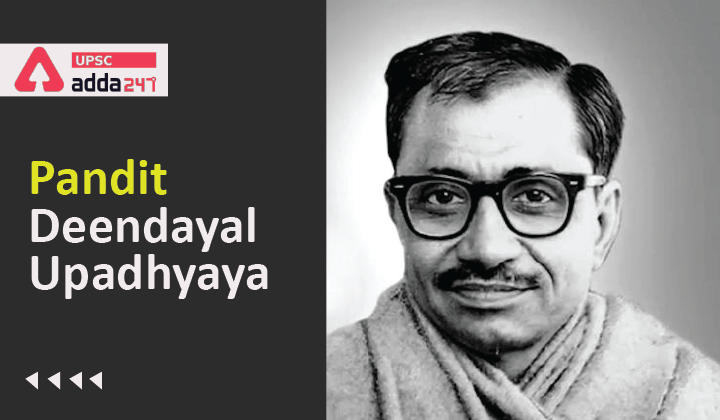Table of Contents
Pandit Deendayal Upadhyaya- Relevance for UPSC Exam
- GS Paper 1: Indian History- Modern Indian history from about the middle of the eighteenth century until the present- significant events, personalities, issues.
Pandit Deendayal Upadhyaya- Context
- Recently, the Prime Minister of India paid tribute to Pandit Deendayal Upadhyaya on his Death Anniversary (Punya Tithi).
Pandit Deendayal Upadhyaya- Key Points
- Birth: Pandit Deendayal Upadhyaya was born in 1916 in Mathura, Uttar Pradesh. His father’s name was Bhagwati Prasad, an astrologer, and his mother Rampyari was a religious woman.
- About: Pandit Deendayal Upadhyaya was an Indian politician and most important leader of the Bharatiya Jana Sangh.
- He was also the forerunner of the present-day Bharatiya Janata Party (BJP).
- Education: Pandit Deen Dayal Upadhyaya completed his intermediate education at Birla College, Pilani, and his Bachelors in Arts at Sanatan Dharma College, Kanpur, in 1939.
- He came in contact with RSS at this college through his classmate Baluji Mahashabde.
- Pandit Deen Dayal Upadhyaya pursued his master’s degree from St John’s College in Agra but didn’t complete it.
Get Free Study Material for UPSC and State PCS Examinations
Pandit Deendayal Upadhyaya- Key Philosophies
- Integral humanism: Pandit Deendayal Upadhyaya defines it as “a classless, casteless and conflict-free social order”.
- The concept of Integral Humanism talks about the integration of indigenous “Indian culture” with the social, political, and economic fabric of the nation.
- The Philosophy of Integral Humanism provides for a holistic approach towards human welfare.
- It envisions that happiness can be achieved through a synthesis of materialism, spiritualism and cautious desire.
- The idea of Bharat: Pandit Deendayal Upadhyaya wanted to decolonize Indian political thought as he felt that the Indian intellect was getting suffocated by Western theories.
- Pandit Deendayal Upadhyay believed that western intellectual colonization of Indian intellect has left a roadblock to the growth and expansion of the original Bharatiya.
- He did welcome modern technology, if, it is to be adapted to suit the Indian requirements.
- Polity: Pandit Deendayal Upadhyaya visualized for India a decentralized polity and self-reliant economy with the village as the base.
- Pandit Deendayal Upadhyaya was against caste polarisation in politics and identity-based voting.
- Pandit Deendayal Upadhyaya wanted people to do their duty while exercising their franchise “in a judicious and intelligent manner”.
- Welfare of People: Pandit Deendayal Upadhyaya was against the left-right division. He believed it is detrimental to the growth of a constructive, transformative pro-people ideology.
- Pandit Deendayal Upadhyaya strongly believed that politics must be controlled by the masses, and not the wealthy.
- He was not in favour of Neoliberalism. He believed it could challenge democracy.
- Pandit Deendayal Upadhyaya emphasized that people’s welfare should not be compromised for corporate interests.
- Pandit Deendayal Upadhyaya pleaded for diversities in economic and social philosophies against a single meta-narrative ruling the world or a nation.
Raja Ram Mohan Roy- Indian Social Reformer
Pandit Deendayal Upadhyaya- Key Literary Works
- He started Rashtra Dharma from Lucknow in the 1940s. It was meant for spreading the ideology of Hindutva nationalism.
- Pandit Deendayal Upadhyaya also started the weekly “Panchjanya” and then the daily “Swadesh”.
- Other Important Literary Work:
- Samrat Chandragupta (1946)
- Jagatguru Shankaracharya (1947)
- Akhand Bharat Kyon? (1952)
- Bharatiya Arthniti: Vikas Ki Disha (1958)
- The Two Plans: Promises, Performances, Prospects (1958)
- Rashtra Jivan Ki Samasyayen (1960)
- Devaluation: A Great Fall (1966)
- Political Diary (1968)
- Rashtra Chintan
- Integral Humanism
- Rashtra Jivan Ki Disha
Pandit Deendayal Upadhyaya- Various Scheme in the Name of Pandit Deen Dayal Upadhyaya
- Deendayal Antyodaya Yojana (DAY).
- Deendayal Upadhyaya Grameen Kaushalya Yojana (DDU-GKY)
- Pandit Deendayal Upadhyaya Shramev Jayate Karyakram.
- Deendayal Upadhyaya Swaniyojan Yojana (DUSY).
- Deendayal Upadhyaya Gram Jyoti Yojana.





 TSPSC Group 1 Question Paper 2024, Downl...
TSPSC Group 1 Question Paper 2024, Downl...
 TSPSC Group 1 Answer key 2024 Out, Downl...
TSPSC Group 1 Answer key 2024 Out, Downl...
 UPSC Prelims 2024 Question Paper, Downlo...
UPSC Prelims 2024 Question Paper, Downlo...
